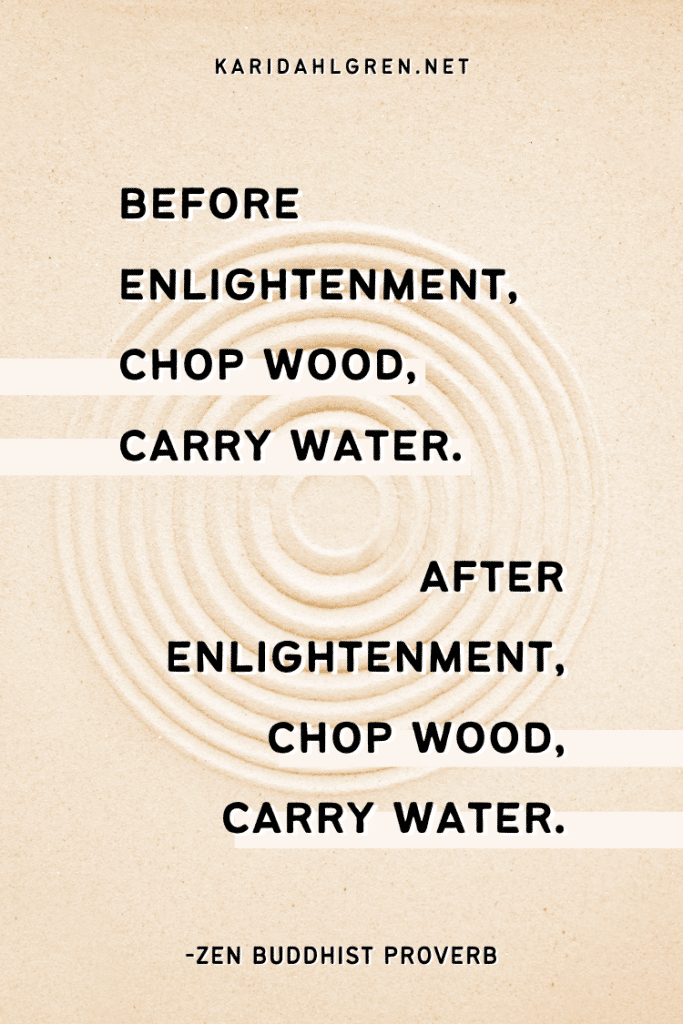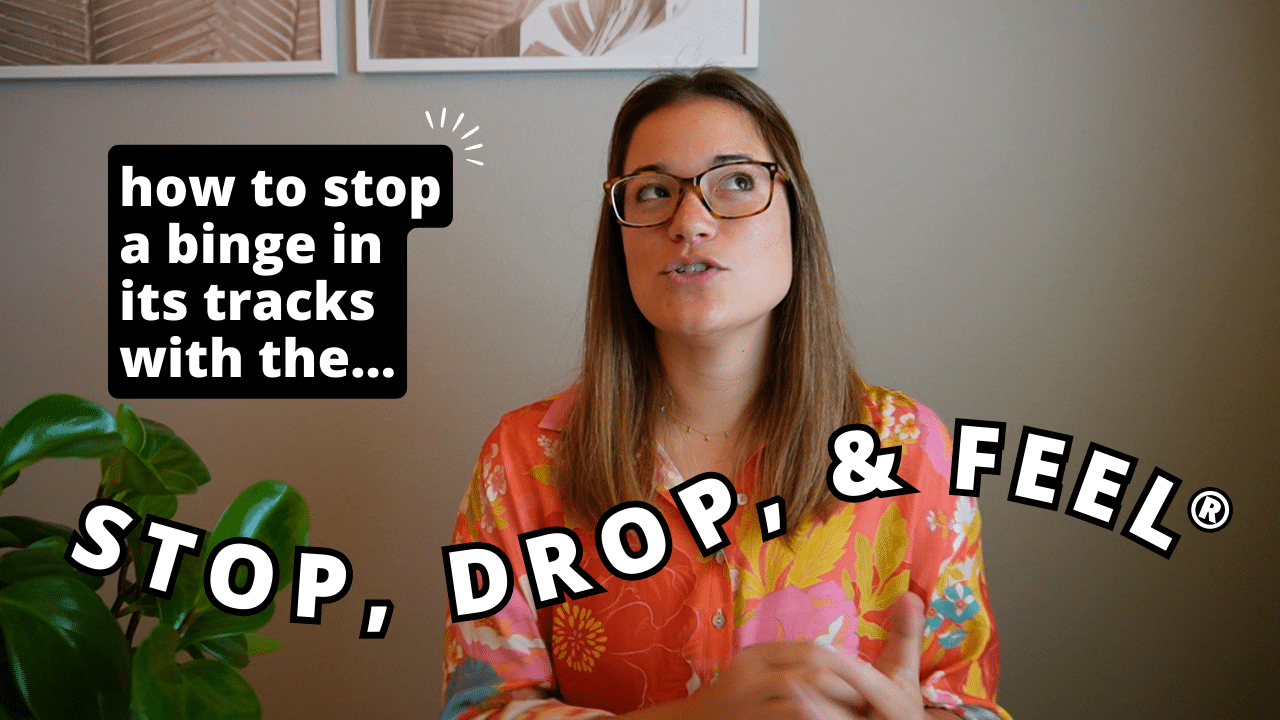
The phrase ‘chop wood, carry water’ is a Zen Buddhist teaching that symbolizes the importance of presence in everyday tasks, no matter how simple they are. ‘Chop wood, carry water’ reminds us that enlightenment and personal growth aren’t hidden in far-off, extraordinary achievements but lie within the mundane acts of daily life.
I personally find this Zen Buddhist saying particularly comforting during challenging times, as it reminds me to breathe, stay focused on the single task in front of me, and just keep doing the next right thing. Equally important, though, is to continue to stay present with everyday tasks even when life isn’t challenging.
In this article, we’ll explore the meaning of the ‘chop wood, carry water’ philosophy, along with practical ways to incorporate mindfulness into your everyday routines, even when life feels chaotic. We’ll also discuss how embracing this approach can ease compulsive habits like overeating, drawing from both philosophical insights and scientific studies.
What Is the Meaning of ‘Chop Wood, Carry Water’?
The phrase ‘chop wood, carry water’ originates from Zen Buddhism and embodies a simple yet profound truth: enlightenment is found not in some distant, lofty achievement but in the humble tasks of daily life.
When you’re going through tough times, focus on the simple tasks in front of you and just keep doing the next right thing. When you’re going through periods of abundance, continue to focus on the simple tasks in front of you, because mindfulness isn’t a means to an end.
Before enlightenment,
chop wood, carry water.
After enlightenment,
chop wood, carry water.Zen Buddhist Proverb
The meaning of the ‘chop wood, carry water’ philosophy is that we should be present and mindful in everything that we do. Rather than seeking spiritual or personal growth in extraordinary events, the Zen teaching suggests that the ordinary—chopping wood and carrying water—is where true clarity and enlightenment reside.
But what does ‘chop wood, carry water’ mean for you? It depends on the daily rhythms of your life. Take, for example, a working parent rushing to prepare dinner after a long day. With meetings, emails, and endless to-do lists piling up, cooking can feel like just another chore, done while half-listening to a podcast or scrolling through their phone.
However, applying the chop wood, carry water philosophy transforms this moment. Instead of rushing through the task, chopping vegetables and stirring a pot can become a form of meditation. It’s a chance to slow down, breathe, and fully immerse yourself in the simplicity of the moment.
The Zen teaching suggests that “before enlightenment”—before experiencing spiritual awakening—we should be fully present even during seemingly mundane tasks, like chopping wood and carrying water. Equally important, “after enlightenment” the same mindfulness should be maintained. Enlightenment doesn’t exempt us from the practices and spiritual development that helped us get there—it reminds us that presence is all we truly have.
Studies Show that Simplicity Benefits Your Well-Being
The ‘chop wood carry water’ philosophy is about seeing the beauty and value in simplicity. The repetition of daily chores, rather than something to rush through, becomes an opportunity for inner stillness and connection to the present moment. When you’re fully present, chopping wood and carrying water become just as meaningful as any grand spiritual pursuit.
On a broader scale, the idea of minimalism, a close cousin of the ‘chop wood carry water’ philosophy, has been shown to have a profound impact on our well-being. A 2023 study in Environment, Development and Sustainability found that minimalist habits such as voluntary simplicity and decluttering increase life satisfaction and fulfillment.[1] By moving away from excessive consumption (materialism), we have more room for what matters.
When Mindfulness Feels Difficult: Are We Addicted to Being Busy?
Simplicity and mindfulness offer many benefits for our well-being. A review study published in Clinical Psychology Review found that mindfulness is associated with improved life satisfaction, self-esteem, empathy, optimism, and even sense of autonomy.[2]
Maybe you didn’t know these exact benefits of mindfulness, but you probably heard this buzzword circling around as something positive for your health. So, if mindfulness is so beneficial, why do many of us struggle to practice it?
One potential answer, influenced by my background as an eating psychology coach, is that addictive tendencies can get in the way. Addictive tendencies could be as obvious as workaholism and compulsive overeating or more subtle like constantly needing to be busy—the very problem that ‘chop wood, carry water’ aims to remedy.
What most addictions have in common is that they provide a temporary escape from uncomfortable thoughts and emotions by keeping the brain occupied. This short-term comfort reinforces habitual behaviors, making it difficult to slow down, be present, and fully embrace the ‘chop wood carry water’ philosophy.
According to a study published in The International Journal of Preventive Medicine, behavioral addictions like workaholism, overeating, and constant busyness mirror substance addiction in how they affect the brain’s reward circuits and reinforce habitual behavior patterns.[3] This can make it difficult for some individuals to access simplicity and mindfulness in their daily life, as the brain has become conditioned to seek constant stimulation and distraction.
In other words, if you know that mindfulness is good for you but struggle to practice it, you’re not alone. Your brain is wired to grow addicted to busyness, and it takes intentional, long-term effort to override those habits.
When our brains are accustomed to constant activity, the simplicity of tasks like chopping wood or carrying water can feel agonizingly slow or even uncomfortable. Being still can actually feel distressing for someone addicted to busyness, making the practice of mindfulness a genuine challenge.
How to Embrace the ‘Chop Wood, Carry Water’ Philosophy: Start Small
Embracing the ‘chop wood, carry water’ philosophy is about finding presence in the mundane tasks of daily life, and the best way to start is small. Begin by choosing a simple, repetitive task—like folding laundry, washing dishes, or even brewing your morning coffee—and focus solely on that activity.
Of course, as an eating psychology coach, I’m inclined to suggest that eating is a great opportunity to practice presence (e.g. mindful eating)—but if you resonate with addictive tendencies, mindful eating isn’t exactly starting small. Even though eating is an inherently simple task, it can stir up uncomfortable emotions for anyone that struggles with overeating or other addictive tendencies (e.g. it can be hard for a workaholic to be present during lunch if they feel the urge to work while eating). So, start with something that’s small to you.
Then, pay attention to the details: the texture of the laundry, the sound of the water, or the smell of the coffee. Pay attention to any urges to multitask or create mental to-do lists. Acknowledge these patterns for what they are—an addiction to busyness that many of us don’t even realize—and try to focus on single-tasking.
According to a study published in Addiction Science & Clinical Practice, mindfulness practices have been shown to increase cognitive self-regulation by enhancing our ability to stay focused on the present moment, which can help reduce automatic, habitual reactions.[4] The human brain gets better at tasks that are repeatedly practiced, which means that even if you struggle with single-tasking, practicing it will help you get better at it.
Furthermore, you don’t need to be all-or-nothing about mindfulness either. According to a study published in Mindfulness, short meditation practices, even as brief as 10 minutes a day, significantly improve mental well-being and reduce stress over time, proving that you don’t need to meditate for long periods to experience benefits.[5]
Some Zen Buddhist enthusiasts love single-tasking and meditating. But for others, the ‘chop wood, carry water’ philosophy can be challengingly mundane. If that’s you, trust that even a small mindfulness practice can have a big, long-lasting impact on your well-being and quality of life.
How I Chop Wood and Carry Water in My Own Life
Part of the reason why I became an eating psychology coach is because I used to struggle with compulsive eating, and intentional living and mindfulness were essential pillars of how I finally stopped.
There was one mindfulness practice in particular that was a lynchpin of my success: my Stop, Drop, & Feel® method. It involves sitting still the uncomfortable emotions instead of reaching for food to buffer them (in an oversimplified nutshell). This tool is unbearably mundane for anyone that struggles with compulsive eating, and that’s why it’s necessary.
Here’s how it works:

Whenever I felt the urge to eat beyond fullness, I would set a timer for two minutes, lie on my bed, and drop in. For those two minutes, I focused entirely on my feelings, exploring any uncomfortable emotions with gentle curiosity instead of resisting them. This simple, mindful practice was a lynchpin of how I stopped binge eating.
Remember, we get better at the tasks that we repeatedly practice. By practicing sitting still with discomfort—a practice that demands enormous presence and mindfulness—I was cultivating emotional tolerance, the ability to withstand emotional discomfort without getting swept into compulsion. This emotional self-regulation skill is associated with reduced compulsive eating.[6]
Although I consider myself someone living in recovery from compulsive eating, I still use the Stop, Drop, & Feel for other forms of compulsion in my life, such as staying busy when I know I need to slow down and feel my feelings. I try to embrace the ‘chop wood, carry water’ philosophy even “after enlightenment” to honor my values and the spiritual practices that helped me get here in the first place.
When in Doubt, Just Chop Wood & Carry Water
The ‘chop wood, carry water’ philosophy isn’t just about being mindful for two minutes at a time; it’s about bringing presence and mindfulness into every aspect of life. It’s about choosing single-tasking over multitasking; simplicity over busyness.
That said, as someone with experience overcoming compulsive and addictive tendencies, I know just how hard presence can be sometimes. Therefore, starting small is key. You don’t need to be perfectly mindful every minute of the day in order to experience personal growth. In fact, there’s power in choosing ‘The Middle Way,’ where perfectionism is abandoned and instead you just keep doing the next right thing.
And sometimes, the next right thing is just two minutes of complete presence, surrendering to the here and now in the precise moment that you’d rather do anything but that.
More related articles:
This may be the end of the article, but if you relate to any of my experience with compulsive eating, and you also enjoy a spiritual dimension to personal development, then I have more to share. Check out my free resources below to keep exploring.



